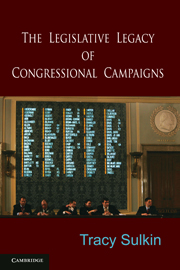Book contents
- Frontmatter
- Contents
- List of Figures
- List of Tables
- Acknowledgments
- 1 Promises to Keep?
- 2 Campaigns as Signals
- 3 Campaign Appeals and Legislative Activity
- 4 Mechanisms Underlying Promise Keeping
- 5 Promise Making and Promise Keeping on Defense and Environmental Issues
- 6 The Who, When, and Where of Follow-through
- 7 The Electoral Implications of Promise Keeping
- 8 Promises and Policy Making
- 9 Representation, Responsiveness, and the Electoral Connection
- References
- Index
5 - Promise Making and Promise Keeping on Defense and Environmental Issues
Published online by Cambridge University Press: 05 June 2012
- Frontmatter
- Contents
- List of Figures
- List of Tables
- Acknowledgments
- 1 Promises to Keep?
- 2 Campaigns as Signals
- 3 Campaign Appeals and Legislative Activity
- 4 Mechanisms Underlying Promise Keeping
- 5 Promise Making and Promise Keeping on Defense and Environmental Issues
- 6 The Who, When, and Where of Follow-through
- 7 The Electoral Implications of Promise Keeping
- 8 Promises and Policy Making
- 9 Representation, Responsiveness, and the Electoral Connection
- References
- Index
Summary
The investigations thus far have demonstrated the value of an agenda-based approach to understanding promise making and promise keeping. Compared to position-based models, which assume that candidates use their campaigns to stake out their stances on a variety of issues, my conceptualization more accurately captures the real-world behavior of candidates, who often focus on their priorities, but more rarely offer specifics about their positions on policies relating to those priorities. For example, they may say that they will work to preserve the environment, but do not offer details on how they will vote on amendments to the Clean Air Act, policies regarding hazardous waste, or proposals to set aside land as wilderness.
Although this lack of specificity is often criticized by both pundits and scholars, I have argued that it is not by itself normatively problematic. The results in Chapters 3 and 4 demonstrate that specificity is not a strong indicator of sincerity, with vague and more detailed appeals serving as equally good predictors of the content of winners' later activity. In addition, because few introduced measures will reach a final passage vote, and because candidates cannot usually anticipate in advance what those might be, broad appeals that discuss a candidate's general orientation on an issue can be just as informative as many specific appeals (i.e., those about a policy that never gets a vote, or that was the focus of attention in a previous congress), enabling voters to infer how that candidate will behave once in office.
- Type
- Chapter
- Information
- The Legislative Legacy of Congressional Campaigns , pp. 99 - 126Publisher: Cambridge University PressPrint publication year: 2011



